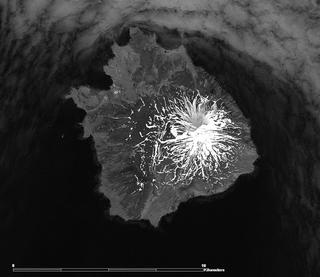Federal Spending Cuts Curb Alaska Volcano Monitoring

Monday, April 01 2013
The Alaska Volcano Observatory is joining the list of agencies that have announced cutbacks in response to the massive federal spending cuts known as sequestration. AVO will stop maintaining its seismic networks on some remote volcanoes.
Late last year, scientists at the Alaska Volcano Observatory picked up a swarm of small earthquakes at Little Sitkin volcano, in the far western Aleutians. They would have been undetectable to humans, but were picked up by AVO’s seismic network on the volcano, and alerted scientists to the possibility of an eruption. While the closest community is 200 miles to the east and wouldn’t have been affected, an eruption could have caused problems for international flight traffic.
Little Sitkin eventually calmed down, but now, things are a little too quiet. The volcano’s seismic network isn’t transmitting data, according to geophysicist Jeff Freymueller.
“Some of the stations are probably working just fine, we just can’t hear them. The data don’t [sic] get back to us," Freymueller says.
He thinks the problem is with the network’s receiver, on nearby Amchitka Island, but says it’s impossible to know without getting out there -- and that isn’t going to happen anytime soon.
“When the USGS [United States Geological Survey] budget is cut, all parts of AVO run short,” Freymueller says.
Last year, AVO’s budget was about $4.5 million, 40 percent less than five years ago. This year’s budget is still being sorted out, but it’s expected to be considerably smaller because of sequestration. Freymueller says that’s why the organization announced Friday that Little Sitkin and two other volcanoes' networks will remain offline for the foreseeable future.
“We’ve got about 25 different networks, and that means we should be doing service at five or six of them every year, and we’ve probably been doing closer to half that. [So,] things start breaking.”
Networks in the populated areas of the Aleutian Islands and Cook Inlet will continue to be high priorities for maintenance. But Freymueller says other, more remote networks that go offline may have to stay that way. AVO will continue to use remote sensing, infrasonic networks and pilot observations to monitor their activity.




David Rowland on Wednesday, April 03 2013:
Move Washington D.C. closer to the volcanoes and the politicos will fall all over themselves coming up with funding... Ridiculous??? So is Washington, D.C.